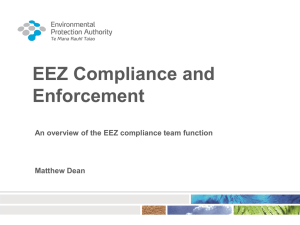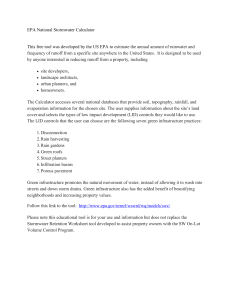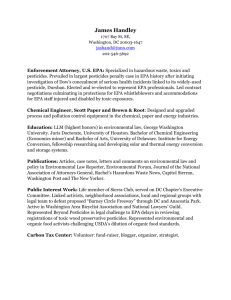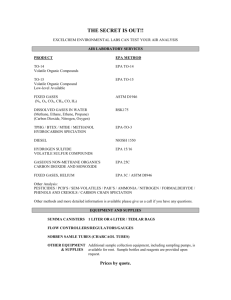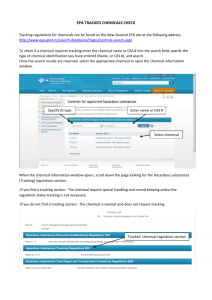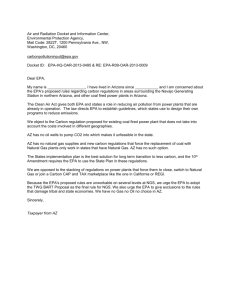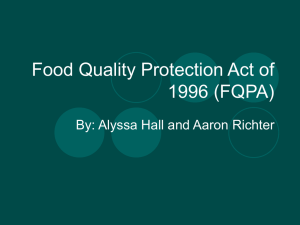Applying the cost recovery policy - Environmental Protection Authority
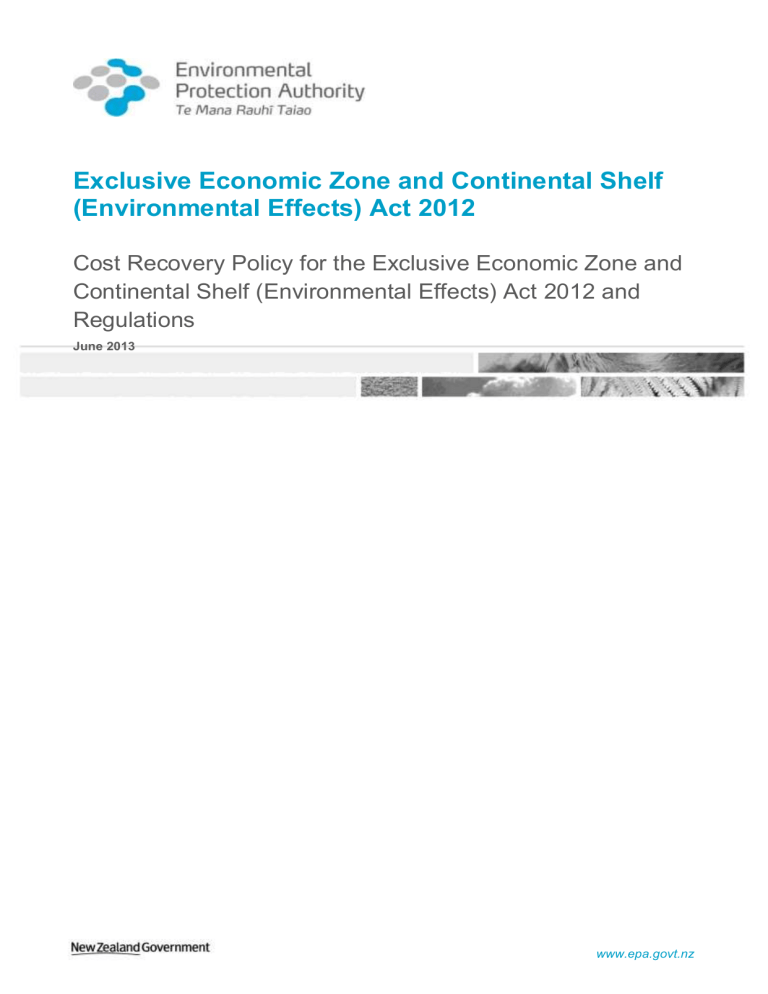
Exclusive Economic Zone and Continental Shelf
(Environmental Effects) Act 2012
Cost Recovery Policy for the Exclusive Economic Zone and
Continental Shelf (Environmental Effects) Act 2012 and
Regulations
June 2013 www.epa.govt.nz
2
Cost Recovery Policy
Table of Contents
The purpose of this policy .................................................................................................................... 3
Statutory authority ................................................................................................................................. 3
Cabinet decisions .................................................................................................................................. 3
The parties .............................................................................................................................................. 4
Principles ................................................................................................................................................ 4
Charging must be lawful ...................................................................................................... 5
Costs must be actual and reasonable ................................................................................. 5
Costs should be transparent ............................................................................................... 5
Costs should be predictable ................................................................................................ 6
Applying the cost recovery policy ....................................................................................................... 6
Transitional provisions ........................................................................................................ 6
Consultation at pre-lodgement for marine consent applications, and at pre-notification for permitted activities .............................................................................................................. 6
Post-lodgement and marine consent decisions .................................................................. 7
Cross boundary consents ................................................................................................... 7
Monitoring marine consents and permitted activities .......................................................... 7
Enforcement ........................................................................................................................ 8
Review and cancellation of marine consent ........................................................................ 8
Payment and objections ....................................................................................................................... 8
Appendices ............................................................................................................................................ 9
Appendix A: Charge-out rates for EPA staff time .......................................................................... 9
Allocation basis ................................................................................................................... 9
Current rates ....................................................................................................................... 9
June 2013 –EPA0259
3
Cost Recovery Policy
The purpose of this policy
1. The purpose of this document is to outline for the public the Environmental Protection Authority’s (the
EPA) policy for recovering costs in regards to its functions under section 143 (2) of the Exclusive
Economic Zone and Continental Shelf (Environmental Effects) Act 2012 (the EEZ Act) and Regulations, including functions and services performed in regards to: a. assisting a person in the preparation of an application for a marine consent, whether or not the application is made; b. receiving, processing, and deciding applications for marine consents; c. receiving impact assessments provided under section 22, 161 or 166; d. administering, monitoring, and supervising marine consents; e. certifying that an activity complies with regulations; f. advising a person proposing to undertake a permitted activity; g. processing information that regulations require a person undertaking a permitted activity to provide, and monitoring a permitted activity if the monitoring is required by regulations; h. reviewing the conditions or duration of a marine consent; i. rulings relating to existing structures that have been grand parented in under the Act.
2. This document provides guidance for those involved in decisions about who and what is to be charged, and explains the basis on which the charges will be made.
3. Further explanation of this policy can be provided at meetings with any person.
Statutory authority
4. The EEZ Act establishes the EPA as the agency responsible for implementing and administering the Act and regulations made under it.
5. Part 5, Sub-part 1, section 143 (1) of The Act requires the EPA to “take all reasonable steps to recover so much of the direct and indirect costs incurred in performing its functions and providing services under this
Act as are not provided for by money appropriated by Parliament”.
6. The EPA’s method of cost recovery and any charges are prescribed in the Exclusive Economic Zone and
Continental Shelf (Cost Recovery) Regulations 2013 (the Regulations).
Cabinet decisions
7. The EPA’s approach to cost recovery is guided by the following Cabinet decisions [CAB Min (12) 44/34 refers]:
June 2013 –EPA0259
4
Cost Recovery Policy
All costs associated with making rulings, preparing, processing and deciding marine consents, and advising on, processing and assessing information lodged in support of, a permitted activity are considered to benefit the applicant and will be cost-recovered.
In recognition that it would be inefficient for the Crown to recover the costs of domestic marine scientific research funded by the Crown, such research will be exempt from cost recovery where the applicant can produce evidence of Crown funding.
In addition, to recog nise New Zealand’s international obligations, costs associated with international marine scientific research will not be cost recovered where the person can produce evidence that the research is funded by an international government.
Also in recognition of New Zealand’s international obligations, costs associated with submarine cabling will not be cost recovered.
Costs for monitoring marine consents and permitted activities are considered to benefit both the applicant and the public. In recognizing this mixed benefit Cabinet has agreed that monitoring costs should be 80% recoverable from the applicant and 20% funded by appropriations from the
Crown.
Enforcement costs associated with investigations and prosecutions, which have arisen as a result of information received from the public or as a result of a routine monitoring exercise, will not be cost recovered.
Any costs associated with education and the raising of public awareness, internal government and international reporting, monitoring for cumulative effects and business systems development will not be cost recovered.
The EPA will engage with the applicant regularly about likely costs in the specific circumstances of the matter. The applicant is welcome to discuss any cost-saving ideas with the EPA.
The parties
8. Parties involved include:
the EPA (a Crown Agent)
a person, for whom the EPA will perform functions and provide services, i.e. who: o intends to apply for a marine consent or seeks advice in regards to a permitted activity; o applies for a marine consent or submits information in regards to a permitted activity; o holds a marine consent or undertakes a permitted activity; o applies to the EPA for a ruling.
Principles
9. The EPA cost recovery policy and its application are also guided by the following fundamental principles.
These principles have been prepared following consideration of Treasury and Office of the Auditor and
Controller-General guidance on charging fees for public sector goods and services.
June 2013 –EPA0259
5
Cost Recovery Policy
Charging must be lawful
10. The EPA will only recover those costs from a person that are allowed for under the EEZ Act.
Costs must be actual and reasonable
Establishing actual costs
11. Evidence of actual costs will be recorded in the following ways:
EPA staff will fill in weekly timesheets recording their time spent on an application/marine consent or processing and assessing information lodged in support of a permitted activity. The timesheets will be signed off by the relevant manager.
Staff hourly rates are set in regulations made under the EEZ Act (hourly rates as at xx are provided in Appendix A). Rates include general overhead costs and exclude GST.
EEZ decision making committee members rates will be calculated in accordance with a Group 4,
Level 1 rating under the Cabinet - Fees framework for members appointed to bodies in which the
Crown has an interest.
The EPA or EEZ decision making committee may commission various reports and services to help them in their work. Contracts will be established for providing these reports and invoices will be paid on receipt of the deliverables.
EEZ decision making committee members will log their time spent and provide evidence of any expenses incurred (eg, taxis or meals) to the EPA.
Hearing and pre-hearing costs, such as venues and transcription services, will be paid on receipt of invoices.
Other relevant disbursements will be based on invoices paid.
Establishing reasonable costs
12. All costs should be reasonable and relate to a particular function. The actual time taken for each task will be recorded and annotated to identify the nature of the activities undertaken. Additional time taken due to training new staff members or internal system faults that result in delays or duplication of effort will not be charged.
13. To the extent that activities arise in the course of undertaking functions in relation to multiple matters (for example, travel costs associated with sequential onsite monitoring of multiple marine consents/permitted activities) the EPA will discuss activities, and costs with the person concerned to assist in determining whether more cost effective options for undertaking the function may be available.
Costs should be transparent
14. It is important that costs are transparent. This is best achieved by:
Having staff hourly rates prescribed in regulations
June 2013 –EPA0259
6
Cost Recovery Policy
Having the cost recovery policy publicly available
Providing an estimate of costs on request, where the cost recovery policy can also be discussed with the person
Describing clearly the basis on which costs are calculated
Tracking accurately time spent and costs incurred throughout the process and providing invoices of costs regularly.
Costs should be predictable
15. It is also important that costs are predictable so that a person can obtain information about what they might be charged for. This is achieved by:
Having staff hourly rates prescribed in regulations
Having the cost recovery policy publicly available
Providing estimates of likely costs on request, which should include a total, costs for major tasks and any assumptions behind the cost estimates
Providing revised estimates of costs before significant additional costs are incurred or where there are significant changes to previous estimates.
16. It is not always possible to estimate all costs in advance as the need for and the scope of tasks involved in processing a matter are likely to develop or change during the process.
Applying the cost recovery policy
Transitional provisions
17. The EPA will seek to recover all costs associated with transitional provisions, for example, receiving and assessing impact assessments under sections 161 and 166 of the EEZ Act and making rulings under section 162 of the EEZ Act. Costs may include such things as staff time and external expert advice.
Consultation at pre-lodgement for marine consent applications, and at pre-notification for permitted activities
18. In order to ensure efficient, cost effective processing of marine consent applications and permitted activity information, consultation with the EPA should begin well before lodgement of the application or notification of the permitted activity.
19. These meetings will ensure the person is aware of the EPA processes and EPA staff are familiar with the proposed activities and relevant issues.
20. In regards to applications for marine consents the EPA may begin to review or draft some documents prior to lodgement of the application. Costs incurred at this stage will be recovered from the applicant as they are directly related to the efficient processing of the marine consent application.
21. EPA pre-notification) advice given to persons proposing to undertake a permitted activity is considered as part of the functions associated with monitoring compliance with permitted activity regulations. These
June 2013 –EPA0259
7
Cost Recovery Policy functions will be charged in accordance with Cabinet decisions relating to monitoring and thus will be liable for 80% of staff time costs and 100% of all non-staff time costs.
Post-lodgement and marine consent decisions
22. If information to support a permitted activity is lodged the EPA is entitled to recover the costs incurred in receiving and assessing the information for completeness. Such costs may include staff time and disbursements (i.e. photocopying/printing, consultant/expert advice, etc).
23. Once a marine consent application is accepted as complete the EPA will notify the application and convene a decision making committee (the EEZ Committee) to decide the application. The EPA is entitled to recover the costs incurred in notification and convening the EEZ Committee.
24. The EPA will provide administrative support to the EEZ Committee considering the application. The costs of the EEZ Committee and of the EPA in exercising its powers will be recovered from the applicant.
25. They may include, for example:
EEZ Committe e members’ time and expenses in assessing the application, attending EEZ
Committee meetings to discuss processes and procedures, assessing information requirements, reading evidence and reports, and writing the draft and final decision.
staff or consultants supporting the EEZ Committee or preparing reports for it
hearing costs, including venue, members’ time, staff and consultants’ time, transcription and related disbursements, and accommodation and catering
public notice of and publication and distribution any reports, including the decision.
Cross boundary consents
26. Where an application for a marine consent is to be decided jointly with another consent authority under section 96, this costrecovery policy will apply to the EPA’s functions.
27. Where an application for a marine consent is to be decided by a Board of Inquiry under section 99, this cost recovery policy will not apply and the EPA’s Cost-Recovery Policy relating to National Significant
Proposals will apply.
Monitoring marine consents and permitted activities
28. Under Cabinet decisions regarding the monitoring function, the EPA will recover 80% staff time costs from the applicant, and all other costs (for example, transport) will be recovered at 100%.
29. Monitoring will be undertaken to ensure compliance with:
marine consent conditions
permitted activity regulations
transitional provisions under the EEZ Act
30. The EPAs monitoring requirements may need to be tailored to the consent conditions/ permitted activity in question. It may not be possible to estimate monitoring cost until further on in the process (for example, after consent conditions have been confirmed). Even then, monitoring is expected to be an ongoing process and as such costs will change over time. The EPA is open to continual engagement with
June 2013 –EPA0259
8
Cost Recovery Policy persons in regards to identifying ways to reduce costs. The information set out below is intended to give an indication of the types of activities the EPA may and may not charge for.
31. Costs may include onshore costs (i.e. staff time associated with receipt and assessment of operatorgenerated, or 3rd party audits, preparation for offshore inspections and post-inspection work, etc) and offshore cost (i.e. transport, accommodation, and staff time associated with inspections, interviews, sampling, etc)
32. Non-EPA costs that arise as a consequence of conditions placed on marine consents will be the sole responsibility of the marine consent holder. Such conditions may include the generation of information and reports, which could be used to ascertain compliance with a condition, for example, those relating to gaining an understanding of the actual effects of activities on the marine environment.
33. Any EPA initiated monitoring outside of that which is required by a marine consent, for example, for the purposes of identifying cumulative environmental effects, will not be cost recovered.
34. Given the geographical location of likely offshore monitoring activities the EPA is conscious that travel costs will form a significant portion of overall costs. Where the EPA undertakes planned offshore monitoring activities it may undertake a single site visit or seek to schedule a number of monitoring visits at one time. The EPA will seek to schedule monitoring visits as efficiently and cost-effectively as possible. Where possible the EPA will work with affected parties to identify cost effective transport options.
Enforcement
35. Costs associated with investigations and prosecutions, which have arisen as a result of information received from the public or as a result of a routine monitoring exercise, will not be cost recovered.
However, if a prosecution is taken an order for costs will be sought as part of the prosecution process.
Review and cancellation of marine consent
36. All costs associated with reviewing or cancelling a marine consent or conditions on a marine consent will be cost recovered from the consent holder.
Payment and objections
37. The EPA will expect payment of invoices, in full, on or before the 20th of the month following invoicing. In accordance with section 147 (3), if the EPA has not received payment within the required timeframe, no further work, to the benefit of the person, will be undertaken until such time as the invoice is paid in full.
38. Further explanatory information on the reasons for the costs will be provided on request from the EPA.
39. The Act does not provide for applicants to object to the costs they are being charged for under this policy.
However, where costs are disputed, the EPA will engage in good faith with the applicant on a case-bycase basis.
June 2013 –EPA0259
9
Cost Recovery Policy
Appendices
Appendix A: Charge-out rates for EPA staff time
Allocation basis
The rates below are provided for in regulations. The rates are based on the average salary for each category of employee, plus overhead costs (comprising personnel costs for EPA support staff, plus corporate overhead costs apportioned across all non-support staff), divided by an average of 1365 working hours per staff member per annum 1 . The allocation basis and the way the calculation is undertaken meet Treasury requirements.
Current rates
The rates for relevant categories of staff are set out below. The rates are contained in the Exclusive
Economic Zone and Continental Shelf (Environmental Effects: Cost Recovery) Regulations 2013. The rates in these Regulations will be adjusted periodically.
Category of staff Hourly rate
Project Administrator
EPA Advisor
EPA Senior Advisor
Project Leader
$97.43
$103.75
$116.12
$140.80
Principal Technical Advisor $290.00
Disbursements will be recovered at cost. Rates exclude GST.
1 Where working hours excludes leave, sick leave, training and the time required for administrative and miscellaneous tasks.
June 2013 –EPA0259
